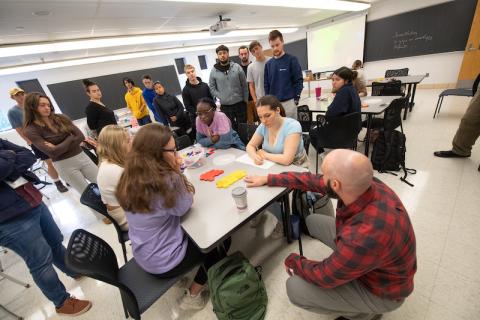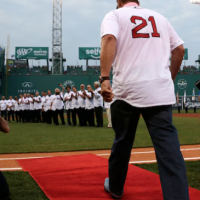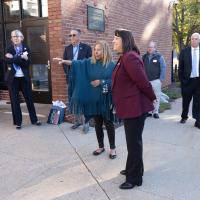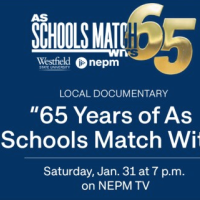
Inclement Weather Closure - Monday, Feb. 23, 2026
Due to inclement weather, WSU will be closed on Monday, Feb. 23, 2026. A campus parking ban is in effect until further notice. See your WSU email for more info.
Dr. Alexander Moore Explains How Math Can Tap Into Your Intuition

Dr. Alexander Moore, Assistant Professor of Mathematics at Westfield State, wants people to know that mathematics is not just an arbitrary set of concepts, but a skillset necessary to navigate life’s challenges. With ten years of teaching experience, Moore has participated a wide variety of environments and is a relatively new fixture on campus after earning his doctorate at Virginia Tech.
This semester, he’s teaching Math 111, titled Math Applications, focusing on using math as a tool to approach real-world problems and finding solutions. “It’s a course for non-majors, so students can develop a mathematical interpretation of the world,” Moore said. “Anything that math is applied to… the course is varied in topics. We’ve interpreted statistics in popular media, applications in geometry, but we also study financial mathematics and how interest is calculated, or how to tell if something is a good deal in terms of finances. It’s very broad.”
Math Applications diverges from other courses in that it is not predicated on a thorough understanding of how algebra or geometry works in the abstract way. Instead, Moore emphasized the importance of embodying the ideals taught, as no one is truly separate from the information they learn and experience.
“I believe that all knowledge comes from our experiences, so mathematics in textbooks is just the product of experiences from the last thousand years,” he said. “The funny thing about teaching mathematics is that we’re trying guide students through that same discovery process. It’s condensed, but with the right activities, you can guide students not only in reading what someone else has written, but through rediscovering the process of those mathematical concepts. There is no content to teach, only people.”
For those concerned about past experience with mathematics, Moore explained how Math Applications can teach students to better identify mathematics in their everyday life. Whether students realize it or not, he said, they are constantly engaging in mathematical patterns, concepts, and ideas.
“The class is not only about the applications of mathematics, but about the actual things we do in our bodies and the experiences we live which produces mathematics,” he said. “I don’t think mathematics is ‘out there’. I think we already know about mathematics because we’ve had certain experiences as a human. That way it’s not a symbolic, foreign language students can’t understand. They feel it with their bodies.”
Subsequently, Moore explained how he’d used physical objects in the classroom to better describe this idea. If students can see how something moves or changes in the world and interact with it, they’ve gained experience, ultimately allowing them to understand how it relates to them in mathematical function. “Mathematics is all around us,” he added. “I think it’s a disservice to students to make it seem like it’s an exclusive club.” From driving to work, flying in planes, or simply playing video games, it’s all math, he explained.
However, the true purpose of the class isn’t necessarily about mathematics for the sake of learning about math, Moore said. It’s about honing one’s critical thinking skills and teaching them how to think for themselves. “That’s what I think school and higher education should be about. You come because there are people that care about you and your development as a person. Then you gain this holistic, intelligent, critical thinking skillset.”
The best part is, for many, critical thinking may begin in the classroom, but is a life-long process which involves every other area of a person’s life. The classroom just helps facilitate this process. “For me, this idea supersedes the content they learn,” Moore said. "I think we develop our critical thinking skills just by having experiences. From those experiences, we’re then equipped to deal with whatever we need to in life. It’s an enormous social responsibility that teachers have… to not misuse mathematics and to not let others misuse mathematics on them too. I see teaching as a critical part of reconstructing society so that people are kinder to each other, more understanding, more compassionate, and are also critical of any information they’re trying to digest.”
Moore also cited John Dewey, an American philosopher and educational reformist who prioritized democracy, explaining the importance of discernment, and especially in a world with conflicting information at every turn. “Dewey said that the only educational training which amounts to anything is teaching students how to understand the meaning of their experiences, so that they’re able to do that in other situations in the future as well,” Moore said. “Westfield State has always been a harbinger of critique of social norms because of its founding as an equitable institution. I’m extraordinarily proud to be here. The idea of a public school system, education for the greater, common good… that was why Westfield State was founded.”
For Moore and many others, mathematics is a language, but at its essence, is a connection between people and the world around them. Taking Math Applications, no matter what a student may be studying otherwise, is a way to tune into this relationship, and Moore encourages those who are interested in developing a stronger intuition to explore what mathematics has to offer.
“It’s about seeing the color in everything they’re experiencing,” he said. “We’re missing this connection to ourselves, so I try to use mathematics to fight against that because I see it as a social responsibility. I can speak for my whole department. We’re very devoted, and I’m amongst friends here. I also know Westfield State is dedicated to these values. We have a bastion here, and we have to protect it. I’m optimistic.”


